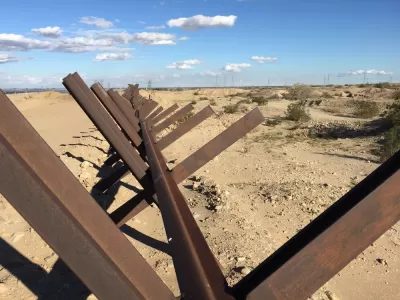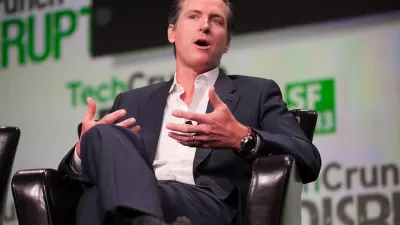The Trump administration has canceled a nearly $1 billion grant assigned to the California high-speed rail project and is attempting to get the state to return the $2.5 billion it has already spent on the $77 billion project.

President Trump, like most Republicans, has never been a fan of high-speed rail and the California project, linking Northern and Southern California via the Central Valley, in particular.
On Feb. 12, Gov. Gavin Newsom (D), the successor to Gov. Jerry Brown (D), the state's long-time champion of high-speed rail, announced during his first state-of-the-state address that "there simply isn’t a path to get from Sacramento to San Diego, let alone from San Francisco to LA. I wish there were. However, we do have the capacity to complete a high-speed rail link between Merced and Bakersfield."
"Late Tuesday [Feb. 19], a Trump administration official pointed to Mr. Newsom’s remarks as an indication that the project was too costly and would never be constructed as planned,'" report Annie Karni and Jennifer Medina for The New York Times.
Given that acknowledgment, the official said, the administration had a responsibility to taxpayers to “cancel the financial support for this boondoggle.”
Also on Tuesday, the Federal Railroad Administration issued this statement canceling the one remaining grant it has yet to award to California and announced the administration's intent to recoup previously awarded grants:
The U.S. Department of Transportation announced today that the Federal Railroad Administration (FRA) intends to cancel $929 million in Federal grant funds yet to be paid for the California High-Speed Rail project envisioned to connect the L.A. Basin to the San Francisco Bay Area.
In addition, the Department announced it is actively exploring every legal option to seek the return from California of $2.5 billion in Federal funds FRA previously granted for this now-defunct project.
Suspicious timing
Both the Times and Gov. Newsom acknowledged that the Trump administration's actions to cancel and recoup the grants came one day after California filed a lawsuit with 15 other states challenging President Trump’s emergency declaration on the border on Feb. 15.
“It’s no coincidence that the administration’s threat comes 24 hours after California led 16 states in challenging the president’s farcical ‘national emergency,’” Mr. Newsom said in a statement. “This is clear political retribution by President Trump, and we won’t sit idly by. This is California’s money, and we are going to fight for it.”
The president didn't even attempt to hide the relationship between the rail project and the border wall by linking the two in his tweet Tuesday morning.
Litigation likely
"It is unclear whether the federal government has the legal authority to withhold the grant from California, and state officials are likely to challenge the move in court," write Karni and Medina.
A 3-page letter [pdf] penned by Ronald L. Batory, Administrator of the Federal Railroad Administration, to Brian Kelly, CEO of the California High-Speed Rail Authority, indicating his intent "to de-obligate the full $928,620,000" grant appears formidable to this correspondent. He states that the Authority "has failed to provide FRA with timely and satisfactory reports."
Criticism was also targeted against the Authority in a state audit issued in November noting that their “flawed decision making and poor contract management have contributed to billions in cost overruns and delays.”
An analysis of Batory's letter by and
Related in Planetizen:
-
Gov. Gavin Newsom to Dramatically Downsize High-Speed Rail Project, February 13, 2019
FULL STORY: Trump Administration Wants California to Pay Back $2.5 Billion for High-Speed Rail

Study: Maui’s Plan to Convert Vacation Rentals to Long-Term Housing Could Cause Nearly $1 Billion Economic Loss
The plan would reduce visitor accommodation by 25,% resulting in 1,900 jobs lost.

North Texas Transit Leaders Tout Benefits of TOD for Growing Region
At a summit focused on transit-oriented development, policymakers discussed how North Texas’ expanded light rail system can serve as a tool for economic growth.

Why Should We Subsidize Public Transportation?
Many public transit agencies face financial stress due to rising costs, declining fare revenue, and declining subsidies. Transit advocates must provide a strong business case for increasing public transit funding.

How Community Science Connects People, Parks, and Biodiversity
Community science engages people of all backgrounds in documenting local biodiversity, strengthening connections to nature, and contributing to global efforts like the City Nature Challenge to build a more inclusive and resilient future.

Alabama: Trump Terminates Settlements for Black Communities Harmed By Raw Sewage
Trump deemed the landmark civil rights agreement “illegal DEI and environmental justice policy.”

Dear Tesla Driver: “It’s not You, It’s Him.”
Amidst a booming bumper sticker industry, one writer offers solace to those asking, “Does this car make me look fascist?”
Urban Design for Planners 1: Software Tools
This six-course series explores essential urban design concepts using open source software and equips planners with the tools they need to participate fully in the urban design process.
Planning for Universal Design
Learn the tools for implementing Universal Design in planning regulations.
City of Santa Clarita
Ascent Environmental
Institute for Housing and Urban Development Studies (IHS)
City of Grandview
Harvard GSD Executive Education
Toledo-Lucas County Plan Commissions
Salt Lake City
NYU Wagner Graduate School of Public Service




























